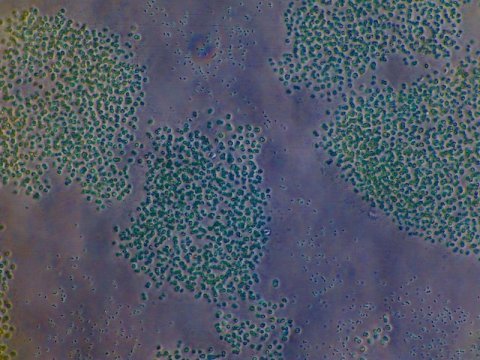Climate change threatens base of polar oceans' bountiful food webs

The cold polar oceans give rise to some of the largest food webs on Earth. And at their base are microscopic, photosynthetic algae. But human-induced climate change, a new study suggests, is displacing these important cold-water communities of algae with warm-adapted ones, a trend that threatens to destabilize the delicate marine food web and change the oceans as we know them.
At the base of marine food webs are microscopic photosynthesizing organisms called phytoplankton (from the Greek phyto for 'plant' and planktos for 'wanderer'). But they vary across the global ocean. Phytoplankton communities in warmer waters, including the tropics, tend to be dominated by prokaryotes (microorganisms without a defined nucleus).
Colder waters nearer the poles, however, tend to favor eukaryotes (microorganisms with a nucleus). These photosynthesizing eukaryotes, or algae, form the basis of productive food webs in cold, but fecund polar waters.
"A lot of our food comes from the North Atlantic, North Pacific and South Pacific fisheries, because of eukaryotic phytoplankton -- not prokaryotes," said Thomas Mock, marine microbiologist at the University of East Anglia (UEA, UK) and senior author of the study. "Prokaryotes are not capable of producing all the juicy proteins and lipids that eukaryotes are."
But according to a new study published September 16, 2021 in Nature Communications, warmer waters and communities dominated by prokaryotes could replace those of eukaryotes much more easily than previously suspected.
"That would cause significant consequences on the entire food web, and therefore ecosystem services that we all depend on," said Mock.
Mock and the other lead scientists had embarked on the study -- a collaboration of eight institutions led by UEA and including the U.S. Department of Energy (DOE) Joint Genome Institute (JGI), a DOE Office of Science User Facility located at Lawrence Berkeley National Laboratory -- with a desire to understand the nuance and gradation of how eukaryotic phytoplankton communities change with latitude.
| Webiste | ScienceDaily- https://www.sciencedaily.com/ |
|---|---|
| Article Name | Climate change threatens base of polar oceans' bountiful food webs |
| Source | DOE/Lawrence Berkeley National Laboratory |
| You can find the article here | https://www.sciencedaily.com/releases/2021/09/210916114639.htm |